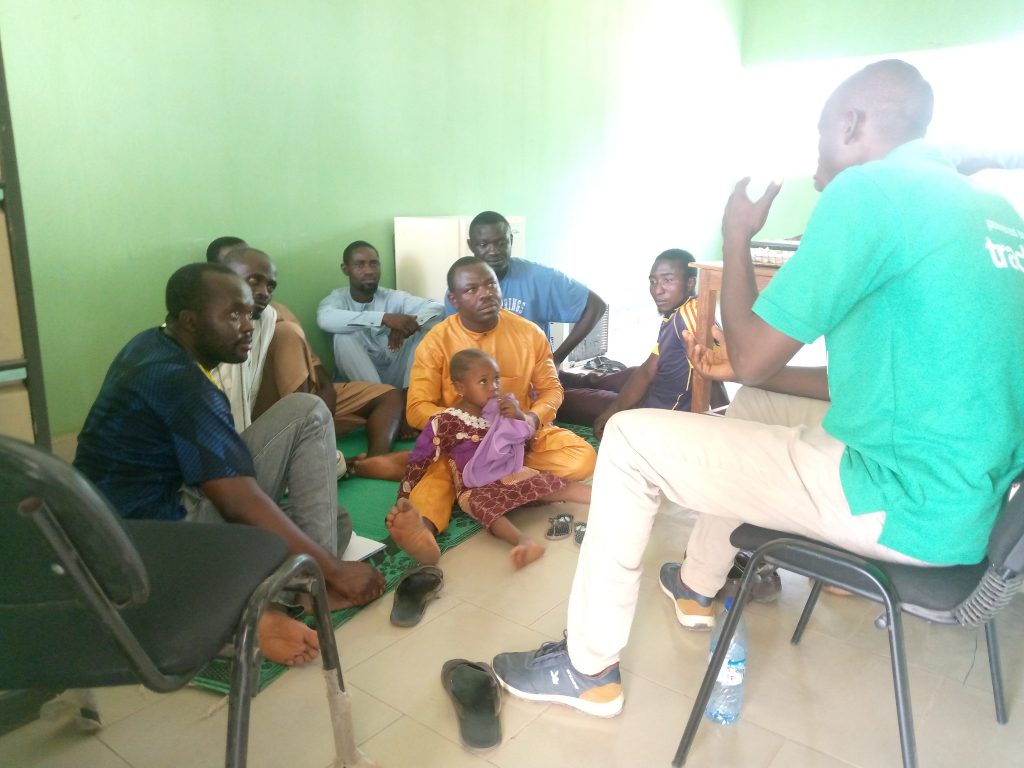A commissioned report by MAWA-Foundation with support from MEEDAN to examine the impact of climate change in the Federal Capital Territory (FCT), Nigeria’s capital city, with an estimated 3,067,500 populations and covers 7,620 kilometres of landmass, has found how rural farmers are losing their yam produce to climate change. A situation that is making them lose income and exposing them to poverty and hunger.
In the Report, MAWA-Foundation conducted six focused group discussions among 78 farmers, 13 in each of the six Area Councils of Abaji, Kwali, Gwagwalada, Kuje, Bwari and AMAC. The discussions were centred on their awareness of climate change and its impact on them.
Farmers in each of the Area Councils at the focused group discussion narrated how they are recording poor yam harvest and decay in storage facilities as a result of a shortage in rainfall and hot weather conditions arising from climate change.
Farmers at the Kwaita community in Kwali Area Council, in a focused group discussion at a local market, recounted how they have lost a huge part of their yam harvest to climate change. Mr. Alkali Obadan, a farmer who led his colleagues to the meeting pegged the loss at 65%. A figure he said was arrived at after obtaining information from other farmers regarding their loss as a result of hot weather conditions.

Recounting their ordeal, Mr. Obadan said in the last 10 years, yams are getting spoilt in the storage facilities as a result of hot weather conditions caused by climate change. He, however, explained that before now, farmers used grasses and green leaves to protect yams from hot weather to preserve them. But because of a change in weather conditions that comes with drought, there are no more grasses and green leaves in the bushes, a development he said has forced the farmers to store their yams in their houses in rooms under excessive hot weather.
“Our yams are spoiling inside the storage facilities as a result of excess hot weather conditions, we are losing money, and each of us has stories of how he lost a huge harvest to hot weather,” Obadan said.
“Information from farmers in our community shows we have lost over 65% of our yam harvest to excess heat as a result of a change in the weather condition” Mr. Obadan disclosed.
Yaba Community
Farmers in the Yaba community in Abaji Area Council, in a focused group discussion led by Mr. Muazu Yaba, recounted how their yams were spoilt in the storage facilities as a result of excess hot weather conditions.
Mr. Aliyu Bashir, a farmer, explained how he lost over 200 tubers of his yam to excess heat coming from hot weather. According to him, his yams started decaying when they could not withstand the hot weather. He explained that the roof and the wall where the yams were stored became extremely hot and that made them decay.
According to Bashir, who claims to be over 40 years, at no time has the community witnessed the kind of hot weather that is prevalent now. This he said is hugely affecting farmers’ productivity and pushing them into poverty.
“I am over 40 years, in my lifetime no time have we witnessed this kind of hot weather that is destroying our yams and other crops like this year,” Bashir said
Affirming Bashir’s narrative, Mr. Garba Yakubu, pointed out that the greatest fear is that both the tubers of yam and seedlings are been destroyed by the heat from the hot weather, a condition he said will make planting yams in the next season very difficult. And that will affect yam propagation which is a threat to food security.
Baragoni Community
Farmers at Baragoni community in Bwari Area Council in a focused group discussion explained how climate change is pushing them into poverty and hunger. Mr. Timothy Inuwa, a farmer, pointing out how climate change has become a big challenge to the farmers, said Yam has since stopped yielding well. A situation he attributed to hot weather condition that comes with climate change.
“Before now, farmers were rich and do not go hungry, but in the last four years, we have witnessed a drastic change in weather conditions that is resulting in poor harvest and pushing farmers into poverty and hunger,” Inuwa said.
Speaking in a worried tone, Inuwa said Yam Farmers are the most hit by climate change. Narrative their ordeal, he said they are witnessing hotness of the weather in a manner they have never seen before. He explained that yams are getting spoilt in the storage facilities as a result of hot weather. According to him, the heat from the sun is too much, making the roof and the wall too hot, resulting in the decay of yams kept in storage facilities which are usually designated rooms in their houses.
Inuwa pointed out that he lost over 300 tubers of his yam (65%) of his harvest to hot weather this year. This is even as he disclosed that there are a huge number of farmers who suffered the same thing as him.
“I lost over 300 tubers of my yam (65%) of my harvest to hot weather this year. Excess heat spoils them inside the storage facility. I am not the only one, many farmers suffered the same thing as I did” Inuwa said.
The farmers said they rely on the grass to store their yams. They go into the bush, cut the grass, and place them on the yams to save them from excess heat and that has been their traditional method of storing yams.
They, however, pointed out that this is no more happening because there are no more grasses as a result of weather change caused by climate change, a situation they said has forced the farmers to store their yams inside rooms in their houses which exposes them to decay as a result of hot in weather condition.
Chibiri Community
Farmers at the Chibiri community in Kuje Area Council, in a focused group discussion, recounted how they are recording huge poor yam harvests as a result of a shortage of rainfall and excess hot weather condition. A situation many of them attributed to climate change that brought a massive change in weather conditions.
Mr. Nasiru Salihu, one of the farmers, disclosed that in the last three years, many farmers in the community harvested high quantity tubers of yam. But, because of a change in weather conditions that have brought a rise in temperature and acute shortage of rainfall, farmers struggle to harvest 100 tubers of yam at the end of the planting season. A situation together with his colleagues says is posing a huge threat to their income and livelihoods.
“In the last three years, many farmers in this community harvested huge quantities of yam tubers. With the current change in weather that has brought an acute shortage of rainfall, we struggle to harvest 100 tubers,” Salihu said.
Corroborating his claim, Mr. Jibrin Zozo, another farmer narrated how the community farmers are losing yam harvest to the extremely hot weather condition that is affecting their storage facilities leading to the decay of many tubers.

Explaining the incident, Mr. Zozo said the change in weather has ushered in excessive heat that is leading to the decay of yam tubers inside the storage facilities. According to him, farmers store their yams in rooms inside their houses or in designated houses outside their homes. He, however, pointed out, the heat that comes with the change in weather conditions makes the roof and wall extremely hot leading to the generation of heat that makes tubers of yam decay.
“The heat one experiences inside a yam storage facility is like that of an oven in a bread bakery, under that condition, tubers of yam must decay, and in the end, farmers are the greatest losers,” Zozo said.
Mr. Dogara Yusuf, another farmer, speaking in a very disturbing tone, said the loss of yam tubers to hot weather conditions as a result of climate change is making farmers lose income, pushing them into poverty and hunger. This is even as the farmers in affirmative voices said the development appears to be a great threat to their survival and may likely lead to an unbearable food crisis.
“Losing our yams to heat as a result of a change in weather that breeds a hot atmosphere, is a dangerous happening to farmers that must be immediately addressed to save the nation from hunger,” Yusuf said.
Dobi Community
Farmers at the Dobi community of Gwagwalada Area Council, in a focused group discussion, took time one after the other to recount how their yam tubers were decayed inside the storage facilities, forcing them to lose income and pushing them into poverty.

According to Mr. Sani Luwa, the longtime tradition of storing yams in the community has been the use of green leaves to preserve them. But the hotness in weather conditions has made it impossible for green grass to grow in the bushes, a situation that forces farmers to store their yams inside a house. Reacting to Luwa’s narrative, the farmers in uniform voices, say extreme heat from the hot weather is making their yam tubers decay inside the storage facilities.
“Our yam tubers are getting spoilt inside storage facilities as a result of excess heat coming from the change in weather conditions, we are losing money and that is not good for us,” Luwa said.
“This climate change is a terrible thing for farmers, it has brought poverty and hunger, and we are recording huge low harvest, how do we survive under this condition,” Garba said.
Expert Opinion
Mr. Thomas Ikemka, a soil scientist and climate change expert who is part of the MAWA team, explained that climate change is impacting the communities visited during the focused group discussions. According to him, the farmers in the communities depend on adequate rainfall for crop production. He, however, pointed out that changes in the shortage in rainfall patterns in the last 10 years suffocate yam in the soil resulting in a poor harvest.
He pointed out that farmers’ activities such as burning firewood and the use of fertilizer contribute to climate change and the decay of yam tubers in storage facilities.
Ikemka is of the opinion that although there is no scientific soil analysis in the communities, the pattern shows a shortage of rainfall that is leading to droughts which occur as a result of the rise in temperatures caused by climate change.
State efforts in addressing climate change
Nigerian State in her efforts to address climate change, established Climate Change Council, created the Department of Climate Change under the Ministry of Environment and has participated actively in global conversations regarding climate change and environmental safety.
Good as these appear, the country is yet to show concrete commitments to addressing climate change beyond political pronouncements. The government and its officials appear not to have sufficient knowledge of how climate change is impacting agriculture and rural farmers.
From what we have found, the Nigerian state and development partners must make considerable investments in mitigating climate change with adequate attention given to rural farmers.
And, in formulating climate change interventions, the locals must be involved in the design and implementation. That way success and sustainability will be achieved as they will own the process and protect it against failure.
Audu Liberty Oseni, MAWA Foundation Coordinator

